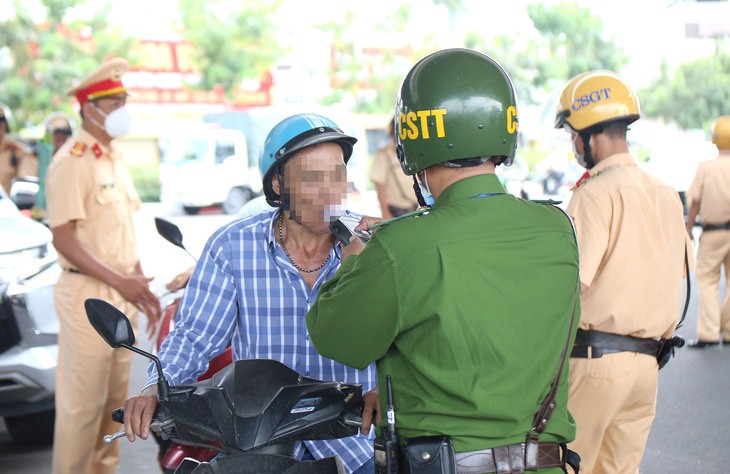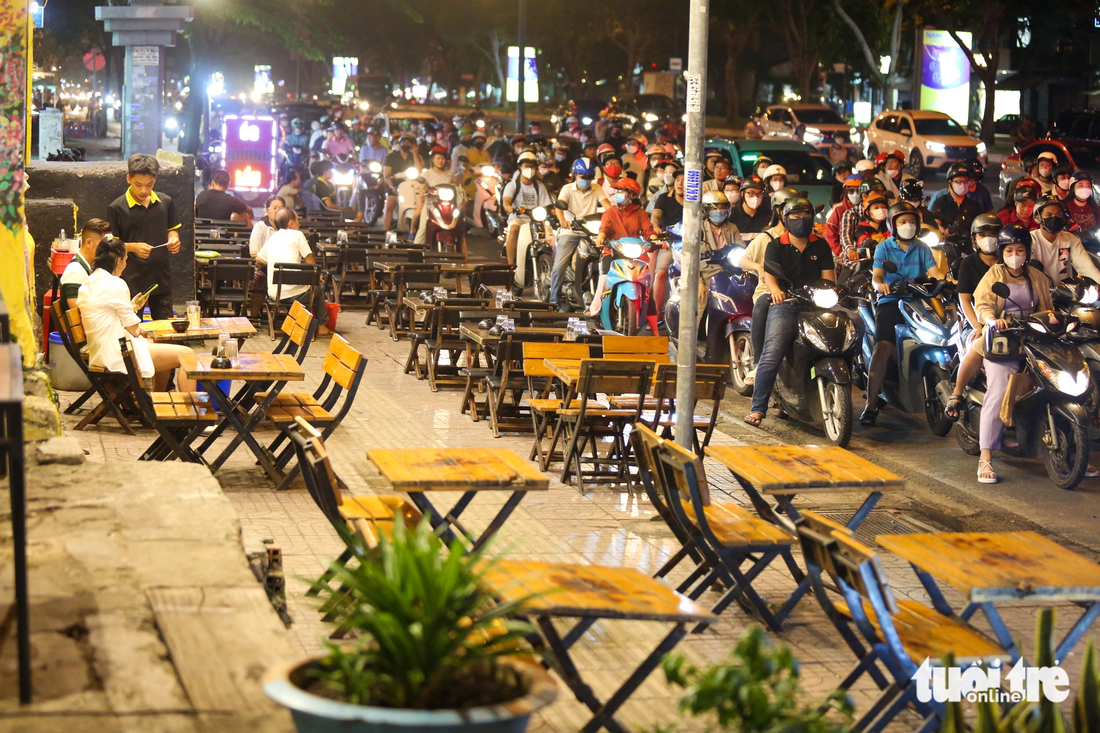The ongoing initiative led by the Ho Chi Minh City police to intensify blood alcohol content testing for suspected DUI drivers represents a commendable effort to enhance public safety and mitigate the risks associated with impaired driving; however, certain residents have expressed apprehensions regarding the impact of the campaign on the night-time economic development.
Vietnam’s law stipulates that drivers must be completely sober, not having downed any amount of alcoholic drinks, while operating bicycles, motorbikes, automobiles, or any other vehicles on the road.
A breath test, where drivers are asked to blow into a device known as a breathalyzer through a plastic tube, can help determine whether there is any hint of alcohol in the person’s breath.
In reality, these tests are conducted throughout the year.
However, Ho Chi Minh City has launched a targeted campaign in anticipation of the upcoming New Year celebrations in January and the Lunar New Year (Tet) festivities in February.
This initiative is strategically timed to coincide with the holiday season when there is a heightened likelihood of residents participating in various festivities and consuming alcoholic beverages.
Under the campaign taking place from November 24 until the pre-Tet time span, more municipal traffic police officers have been sent to the streets than normal to check if drivers have alcohol in their bodies.
They are divided into 10 teams to detect alcohol-impaired drivers, with five taking responsibility for the downtown area and the other five for outlying areas. These teams also include police officers from Thu Duc City and other districts.
They conduct breath testing both day and night.
The campaign is aimed at promptly detecting DUI drivers and stopping them from controlling vehicles, thus improving locals’ awareness, reducing traffic accidents caused by drunk drivers, and protecting the lives of commuters.
A leader of the municipal traffic police unit told Dan Tri online newspaper on Monday that they tested 54,590 drivers, including over 19,000 motorists and 35,860 motorcyclists, between November 24 and Sunday last week and detected more than 1,600 alcohol level violators. Notably, two car drivers and six motorbike riders tested positive for drugs.
According to the municipal traffic police, local residents’ awareness of complying with traffic regulations has improved, as they have started using motorbike taxis, taxis, and ride-hailing services after consuming alcoholic drinks.
Between August 30 and October 15 this year, when the Ministry of Public Security launched the same campaign in 58 localities, the number of traffic accidents and casualties plunged year on year, news site Vietnamplus reported.
Police officers detected over 6,000 violators during the period. However, there were 50 accidents caused by drunk drivers, killing 19 people and injuring 48 others, plummeting 37.5, 52.5, and 25 percent, respectively, over the same period last year.
There were no extremely serious accidents during the period.
Taverns experience slump
Many restaurants and eateries offering alcoholic drinks in Ho Chi Minh City have experienced a tough time as their revenue and customers have tumbled.
They attributed the situation to the campaign to reduce alcohol-impaired drivers and the economic downturn.
Beer joints and nightclubs along Pham Van Dong Boulevard in Go Vap District have few customers who order only snacks, not beer or wine like before.
Gathering with his friends after work at a restaurant on Hoang Sa Street in District 1, Hong Vinh said he and his friends drank a couple of bottles of beer whenever they met previously, but they now enjoy dishes and chat only.
Individuals keen on drinking with friends have become hesitant as traffic police officers are now present at all intersections. Some have chosen beer joints near their houses so that their family members can pick them up after parties.
Some have even given up the habit of hanging out with friends and enjoying alcoholic drinks after work.
Cong Minh, the owner of a beer joint on the boulevard, said his facility saw a decline of 40-60 percent in the number of guests and 50 percent in revenue.
A nearby beer joint also had its customers fall by 60 percent.
Dung, the owner of a tavern on Truong Sa Street in District 3, said he had operated the tavern for 10 years. He had to close his facility during the COVID-19 pandemic and reopened it recently.
However, it has experienced a slump amid police’s efforts to catch drunk drivers.
“Customers do not dare to drink as checkpoints with traffic policemen are everywhere,” Dung said.
Some 300 meters apart, another beer joint saw no customers although it was 8:00 pm, the peak time for gatherings.
Many restaurants and beer joints have prepared motorbikes and taxis to transport customers home if they have a demand. They expected the situation to improve during the Tet holiday.
According to several residents and experts, the early closure of restaurants and eateries may affect the night-time economy as this may dishearten tourists from visiting earlier-bustling venues.
Truong Cong Dan, a representative of Du Ky Seafood Restaurant in District 1, said he had returned the space of a branch of his diner on Vo Van Kiet Avenue after three years of operation.
“My current restaurant is located on a backpacker street but its turnover has halved against last year. Customers meet friends and partners but order neither beer nor wine as they are afraid of violating the alcohol concentration limit,” Dan said.
"As a result, they leave early."
To retain customers, the restaurant has increased the entertainment space, invited singers and DJs, and provided some dishes at no charge or discounted prices.
“We aim to serve tourists at night and white-collar workers during the daytime,” Dan informed.
Duong Thanh Dao, vice-chairman of the Ho Chi Minh City Food and Beverage Association, said the association received many members’ complaints about their difficulties in doing business given a fall in customers.
This is an issue of the food and beverage and tourism sectors, Dao noted, adding that tourists would not prefer places where restaurants and eateries close at 9:00-10:00 pm.
It is necessary to come up with solutions to ensure that customers can safely travel on the streets after drinking alcoholic beverages, Dao said.
Restaurants have offered services of keeping vehicles overnight, transporting customers home, and helping the customers book ride-hailing services.
They should be boosted to develop residents’ habit of using these services.
Dao said the requirement that drivers be absolutely sober while operating vehicles is too strict. He proposed recalculating the permitted alcohol concentration cap.
Hoang Tung, an expert in F&B, said the sector has faced a decline in sales this year. However, the reduction of alcoholic drinks is an indispensable trend in the future.
Sharing the same view, Hoang Van Viet, chairman of the Vietnam Beer, Alcohol Beverage Association, said the economic downturn had forced consumers to tighten their budgets, including expenses on beverages.
Moreover, sanctions against drunk drivers have discouraged residents from downing alcoholic beverages.
Despite supporting the campaign, he noted that drinking is an entertainment demand. Therefore, besides issuing bans and fines, local authorities should come up with solutions for removing bottlenecks in the F&B sector, such as developing public transport services.
He suggested amending the regulation that drivers be completely sober to match the reality and international practices.
Alcoholic beverage firms have also contributed significantly to the state budget, created jobs for laborers, and fostered related sectors, Viet noted.
|
|
| A restaurant on Pham Van Dong Boulevard in Go Vap District, Ho Chi Minh City experiences a slump in revenue. Photo: Phuong Quyen / Tuoi Tre |
Tax revenue from alcoholic drinks plunges
The special consumption tax revenue derived from beer and wines constituted 46 percent of the total special consumption tax collected by Ho Chi Minh City from January to October this year, the local taxman said.
However, this figure represents a decrease compared to the same period last year, where the revenue from beer and wines accounted for 82.2 percent of the total special consumption tax.
Sales of three major alcoholic beverage companies -- Sabeco, Sai Gon Binh Tay Beer Group JSC, and Heineken -- fell sharply in the period.
Their total sales were some 84 percent over the same period a year ago.
Arousing controversies
The testing of drivers both day and night has caused mixed opinions among residents. Many people said the testing during the daytime, especially in the morning, is unnecessary and wastes their time as they are mainly on the way to work.
In response, a police officer in the city said they follow the plan to conduct breath testing and have still detected violators.
Nguyen Duc Hung, a 55-year-old resident of Thu Duc City, was surprised when being pulled over by policemen to undergo a breath test in the daytime. As he was sober, the traffic police officers let him go.
Le Tho, dwelling in Phu Nhuan District, said many drunk drivers still control vehicles but not all traffic accidents are caused by such wasted drivers.
Tho suggested pinpointing the times when intoxicated drivers are more likely to be on the streets.
He believed that conducting breath testing during daytime hours, particularly during peak traffic periods, is not ideal.
He further recommended identifying traffic accident hotspots for strategically placing checkpoints as well as publicizing information about various types of breathalyzers through mass media channels.
Relevant agencies should clarify which alcohol level can cause people to fail to control vehicles. The condition of each individual is different, so an average level should be worked out.
Without scientific foundations, the campaign will cause controversies, Tho noted.
Meanwhile, traffic police officers in Da Nang City, central Vietnam mainly do the job in the afternoon and evening, said deputy head of the municipal traffic police Pham Hong Hai.
He added that they conduct breath tests consistently throughout the year and intensify their efforts, doubling the frequency, during holidays and weekends.
Residents in Thu Duc City voiced their concerns over many people using a breathalyzer, saying that it was unhygienic, thus affecting their health.
At a meeting on Saturday last week, secretary of the municipal Party Committee Nguyen Van Nen said that the city has enhanced alcohol level testing among drivers to ensure safety for road users and minimize crashes.
Nen added that adjustments will be made to the job to ensure minimal disruption to the lives of local residents.
Pursuant to prevailing regulations, motorcyclists with an alcohol concentration level below or equal to 50mg in 100ml of blood or 0.25mg in one liter of breath shall be fined VND2-3 million (US$82-123) each and have their driver’s licenses revoked for 10-12 months.
The monetary punishment will be VND4-5 million ($164-205) if the alcohol concentration level is between 50 and 80mg in 100ml of blood or between 0.25 and 0.4mg in a liter of breath.
Violators will also see their driver’s licenses seized for 16-18 months.
Inebriated motorbike riders with an alcohol concentration level exceeding 80mg in 100ml of blood or 0.4mg in a liter of breath will be fined VND6-8 million ($247-329) and have their driver’s licenses revoked for 22-24 months.
For car drivers, the respective penalties will be VND6-8 million ($247-329), VND16-18 million ($658-740), and VND30-40 million ($1,233-1,645) each. The driver’s licenses will be revoked for 10-12, 16-18, and 22-24 months, respectively.
Law enforcement will impound the vehicles of individuals found to be violating the alcohol concentration limit for seven days at most.
Like us on Facebook or follow us on Twitter to get the latest news about Vietnam!





















































